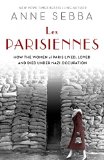Page 4 of 5
There are currently 31 member reviews
for Les Parisiennes
-
Anbolyn P. (Gilbert, AZ)
Les Parisiennes by Anne Sebba
In Les Parisiennes, Anne Sebba examines what life was like for Parisian women under Nazi occupation during WWII. Using stories gleaned from interviews and primary sources, she documents the everyday hardships and life-changing tragedies suffered by these resilient women. Women from all walks of life were forced to adapt to food shortages, the disappearance of family members, and potential capture or unwanted attention from German soldiers. How they chose to respond to these challenges often determined the fate of generations. Sebba's lavish use of detail and her graceful, sympathetic writing add to this book's powerful depiction of an era that still fascinates us today.
-
Kathleen B. (Las Vegas, NV)
Hard to read
I applaud Anne Sebba's meticulously researched work on this book. But the telling is too hard to follow and 100 people listed in the book isn't something most people can manage. It was wonderful to be able to get a glimpse into what the Parisian women went through during WWII and shortly after. I usually read historical fiction so that could be why I found this book so difficult to read. I especially didn't like the French language phrases and words with no translation. I would only recommend this book to a real history buff.
-
Rosemary C. (Austin, TX)
Interesting topic, Disjointed writing
I was excited to read this book when it arrived, and although it contains very interesting historical information, it is written in a very disjointed manner. Seriously, it needs some serious editing. It turned into a slog of a reading project although this topic should have made for a fascinating read.
-
Donna T. (Tacoma, WA)
Meticulously researched and documented
Wow, was this book well researched and the life of women under Nazi occupation meticulously documented! I don't think I have ever seen this much data accumulated and presented in just under 400 pages outside of academia. While I greatly appreciated getting a detailed look at the very complicated, stressful and dangerous situation of living in Paris during this time frame,
With presentation of this massive amount of data comes complications, some of which Anne Sebba did not overcome. Because she chose to tell the story in almost strict chronological order, the stories of individuals were at times disconnected and hard to follow. Because there were literally hundreds of stories, facts and names of individuals, I found it hard at times to follow the thread of connection. She also, at times, used French phrases without translations or a context that I understood, which I found very distracting. And at times put in a quote, from some one famous at the time, which I found did not add any better understanding to the story she was trying to tell.
Even with those criticisms, I felt I learned a lot about an incredibly sad period in our history. These are the types of stories that need to be told and retold, so that we never forget.
-
Marybeth T. (Bellingham, WA)
Good Historical Non Fiction
I enjoyed this book. I really didn't know very much at all about Nazi regime in Paris. It got a bit bogged down in places, but overall it was a good read.
-
Alan K. (Westport, MA)
Little known history
Les Parisiennes covers the history of women in occupied France during World War II. All aspects are addressed from heroism and sacrifice to fraternizing with and aiding the Nazi occupiers. The occupation and post war period is covered year by year. Best are the stories of individuals and personal experiences, many of which prove to be quite powerful. Unfortunately since many of these stories are covered in short segments appearing throughout the book, some prove difficult to follow. But overall Les Parisiennes is a long overdue and vital overview of a historically neglected part of World War II.
-
Becky H. (Chicago, IL)
Scholarly WWII work
This is a very, very dense scholarly book concerning the women of Paris during WWII. I ended up reading it as a collection of brief episodes as it was difficult to follow any one person's activities because of the chronological order of events and the various names used by the women during the course of the war. The "Cast list" was almost useless as women were listed under their family name, or their husband's name, or their resistance name, etc, but not all of them.
There are many French language phrases and words used throughout the book without translation.
You really need a very good working history of France and WWII to understand the enormity of places and events mentioned in passing, ie, the Hiv d'Vel roundup, Ravensbruck medical experiments, the Comet Line and others.
I would not recommend this book to my book group although I did appreciate the work that went into the writing of the book.
